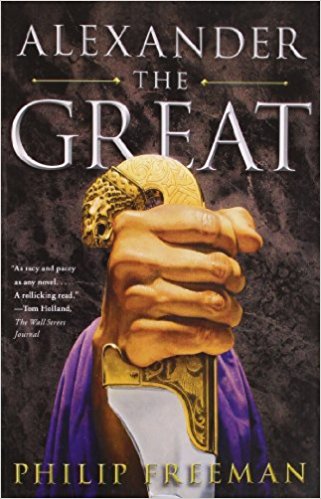Alexander the Great Summary
5 min read ⌚
 The Macedonian who conquered the world
The Macedonian who conquered the world
Another legend echoes through time.
Alexander the Great achieved everything and will be remembered as the greatest conqueror ever to set foot on Earth.
We summarize Alexander’s rise to power and the events that shaped his personal life.
Who Should Read “Alexander the Great”? And Why?
The history of humankind is filled with blood, treason, adultery, sex, and war. Since the beginning of time, the desire for power carved the human way of life.
“Alexander the Great” is not a book suitable only for history enthusiasts; it’s also perfect for anyone willing to explore the world of our ancestors.
About Philip Freeman
 Philip Freeman is an author and a college professor teaching at Luther College in Decorah, Iowa.
Philip Freeman is an author and a college professor teaching at Luther College in Decorah, Iowa.
He wrote several books including Julius Caesar and St. Patrick of Ireland.
“Alexander the Great Summary”
When Alexander’s heart stopped beating, his empire was so great, probably the biggest the world has ever set eyes upon. Ancient Macedonia covered around two million square miles, which represents a massive amount of land, by any standards – stretching from the Balkans to Afghanistan.
This accomplishment granted him the privilege of being remembered as the greatest conqueror of all time.
Let’s take it from the top:
Alexander was born in the capital of Macedonia at the time, the city of Pella in 356 BC. Even today, there are still confrontations between The Republic of Macedonia and Greece about the origins of Alexander III.
His father, a legendary and strong ruler, known as Philip II of Macedon, was also a respected warrior and military commander, who managed to consolidate all Greek States under his sovereign rule.
As Alexander grew stronger and wiser under the leadership of Aristotle, everyone, including Philip saw his enormous potential. At one occasion King Phillip even said to him “Macedonia is not big enough for you!”
As things were back then, Philip sensed a threat to his throne – arising from his ambitious son. Not long afterward, some people plotted against the King including a man, who was one of Philip’s bodyguards – called Pausanias of Orestis.
As a result of the assassination committed by Orestis, Alexander began his bloody reign at just 20 years of age.
Eager to earn respect among the Greeks, he immediately started planning a military campaign. With an intention to expand his empire, he devised a plan to invade Persia. King Darius for years had been causing trouble to the Greek States, and it was time to put an end to these unresolved affairs.
However, not all Greek States paid homage to Alexander. Thebes, for example, saw Alexander as a tyrant and refuse to accept his rule. The rebellion was crushed in a matter of days, and all other cities had little choice but to embrace Alexander’s notorious power.
With things settled at home, Alexander had achieved a piece of mind, and enough room to put his military plan into action. He didn’t rely solely on brute strength and numbers but preferred ingenuity and military sharpness.
Time after time, Alexander transformed environmental obstacles into his advantage. Even the skepticism from experienced generals like Parmenion didn’t have any influence on him.
His winning streak continued only because of his sharp wit that defied conventional military approach – which wasn’t enough to catch the enemy off guard. With the help of the same methods, Macedonians captured the port city of Telmessus.
He used shrewdness to conquer many cities, and at one occasion a group of female dancers sneaked into one of Darius’s fortresses to perform for the Persian soldiers. Alexander’s ingenuity made the Persians an easy prey for the dancers who literally assassinated a whole garrison of drunken men.
After years of war, Alexander faced pressure from his fellow countrymen to abandon his campaign and go home. Macedonians feared that the Persians would outflank them and attack their homes. By delivering a speech, Alexander III persuaded his soldiers to continue fighting until Darius is defeated.
Now almost victorious, Alexander held thousands of Persian captives, including Darius’s mother and son. The Darius’s family knew that their fate is sealed, but Alexander was not a man of tradition, and he spared their lives; even granted them high-status in the newly established kingdom.
Darius’s forces still had an advantage in numbers, and yet they were no match for Alexander’s army. Regardless of the enemy’s strengths, Alexander pushed and almost reached Darius on the battlefield before he was forced to return and aid his left flank, which struggled the hold off the Persians.
Darius once again managed to escape capture, and Alexander even though he defeated the rest of the Persian army, was not pleased.
Finally, Alexander entered the city of Babylon as a savior not as a conqueror, greeted with music, love, and gifts from the residents. Evidently, the Macedonians now expected that the battle is won and they are free to go to their homes.
By 327 BC, Seven years have passed from the moment when Alexander the Great and his army of lions set foot in Persia. To show his love and compassion for the conquered people, he even agreed to marry a local girl named Roxane.
Nothing could stop Alexander from going even further to the East. Alexander imagined that his name would remain forever in the legends as the only man who ruled the Entire World. The generals, however, once again doubted his plan and advised him to return to Pella and raise another army consisting of “fresh” Macedonians.
At the journey back home, Alexander started to feel ill. His condition was not getting any better, and there wasn’t even the slightest beacon of hope that he would rise again.
Alexander shared his last words when he was asked by his companions – Who should succeed him? – He replied “The strongest one of all.”
Key Lessons from “Alexander the Great”
1. Conquering doesn’t always indicate victory
2. Bring excitement to your people
3. Name a successor
Conquering doesn’t always indicate victory
A real victory is achievable only if you are capable of holding the kingdom in one piece.
A lesson well-learned by all Macedonians right after Alexander’s premature death.
Bring excitement to your people
Alexander, unlike other rulers, didn’t oppress the people he conquered.
Instead, he wanted to earn their love and trust.
Name a successor
Alexander failed to name a valid successor, which resulted in long-lasting war among the noblemen.
Dying without a son – back in those days, was a clear sign that the land will be torn by war.
Like this summary? We’d Like to invite you to download our free 12 min app, for more amazing summaries and audiobooks.
“Alexander the Great” Quotes
Jealous men only tormented themselves. Share on X Alexander was and is the absolute embodiment of pure human ambition with all its good and evil consequences. Share on X As Alexander would confess years later, sex and sleep more than anything else reminded him that he was mortal. Share on X History has been so fascinated with Alexander the Great that it has overlooked the genius of his father. But by his supreme skill at diplomacy, his mastery of intrigue, and his revolutionary innovations in warfare, Philip laid the… Share on XOur Critical Review
Even though Dante Alighieri believed that Alexander the Great has its place in one of the circles of hell, this great conqueror managed to do something that’s never been done before.
Our first impression of the book was wonderful, and we recommended it to everyone.
Emir is the Head of Marketing at 12min. In his spare time, he loves to meditate and play soccer.


 The Macedonian who conquered the world
The Macedonian who conquered the world




